
PO Box 9021, Wilmington, DE 19809, USA
E-mail: font@focusonnature.com
Phone: Toll-free in USA, Canada, & Puerto Rico 1-800-721-9986
or 302/529-1876; Fax: 302/529-1085

PO Box 9021, Wilmington, DE
19809, USA
E-mail: font@focusonnature.com
Phone: Toll-free in USA, Canada, & Puerto Rico 1-800-721-9986
or 302/529-1876; Fax: 302/529-1085
HIGHLIGHTS
FROM FOCUS ON NATURE TOURS in 2008
INCLUDED HERE ARE BIRDING & NATURE TOURS CONDUCTED IN:
ARGENTINA, ARIZONA, BRAZIL (2 tours), the DOMINICAN REPUBLIC,
GUATEMALA, ICELAND, JAPAN, the LESSER ANTILLES (on the island of DOMINICA), MEXICO
(3
tours: 2 in the Yucatan, with 1 on Cozumel Island and 1 tour in Sonora), NEW JERSEY (Cape
May), and PARAGUAY.
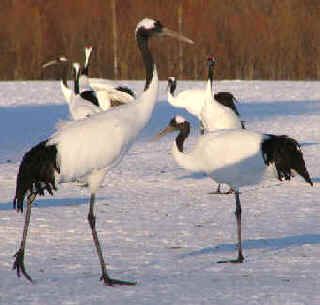
Red-crowned
Cranes, as seen during
the FONT January 2008 Japan Tour in Hokkaido.
The tour summaries here are given with the most-recent tours first.
![]() For some tours there
are links below for longer NARRATIVES. Also
there are links to UPCOMING TOUR ITINERARIES, and LISTS relating to BIRDS,
MAMMALS, & OTHER NATURE.
For some tours there
are links below for longer NARRATIVES. Also
there are links to UPCOMING TOUR ITINERARIES, and LISTS relating to BIRDS,
MAMMALS, & OTHER NATURE.
Links to Tours:
GUATEMALA (December 2008/January 2009)
MEXICO (mostly in the Yucatan) (November 2008)
ICELAND (September/October 2008)
NEW JERSEY, USA (mostly Cape May) (September 2008)
southern ARIZONA, USA & northern MEXICO (Sonora) (August/September 2008)
BRAZIL (Southeast & Mato Grosso do Sul) & adjacent ARGENTINA & PARAGUAY (July/August 2008)
MEXICO (mostly in the Yucatan; also Cozumel Island) (June 2008)
DOMINICAN REPUBLIC (March/April 2008)
BRAZIL (Southeast, Minas Gerais, & Mato Grosso do Sul) (March
2008)
JAPAN (Honshu, Hokkaido, Kyushu) (January 2008)
LESSER ANTILLES (Dominca) (January 2008)
![]()
Guatemala - December 2008/January 2009
During this tour, our
15th in Guatemala, as many as 317 species of birds were found throughout a country
with a variety of habitats and some most spectacular scenery. Highlights
among the birds included: Pheasant Cuckoos, Orange-breasted Falcons, and
Ocellated Turkeys near the Mayan ruins at Tikal,
5 species of kingfishers during
one river-boat ride in the Peten in addition to
Sungrebe and Boat-billed Herons,
while in the mountains our birds included: looks at both Ferruginous and
Mountain Pygmy-Owls, Chestnut-sided Shrike-Vireo, Blue-and-white Mockingbird, Black-throated and
Bushy-crested Jays, Hooded Grosbeak, Pink-headed Warbler, and the dapper Prevost's Ground
Sparrow.
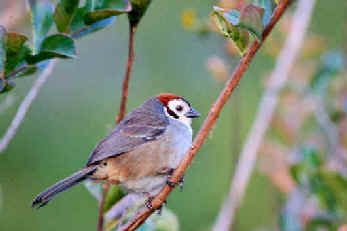
Prevost's Ground Sparrow
And there were more than birds, as would normally be the case during a tour in
the Neotropics. But what was not expected was to be another tour with ANOTHER
JAGUAR, following our previous tour a couple months earlier just to the north in
southern Mexico when that large, wild cat was also encountered. During the Dec
08/Jan 09 Guatemala tour, the Jaguar was at Tikal at night, where it roamed just
outside our rooms. The roar of the animal was heard 3 times there during one of
the nights of our stay.
Other animals during the tour included: both Yucatan Howler and Central American
Spider Monkeys, White-nosed Coatis, Central American Agoutis, and
White-tailed Deer. We saw all of them during the day not far from where the
roaring Jaguar wandered about at night.
In the mountains, in darkness before dawn, a sound that we heard was that of the
animal called the Cacomistle (a raccoon-like creature).
In darkness, after one fine day of our tour, we saw in the distance the red glow
in the sky and the red flow on the slope of a high Guatemalan volcano - another
notable experience during our week-plus "festive, holiday
tour".
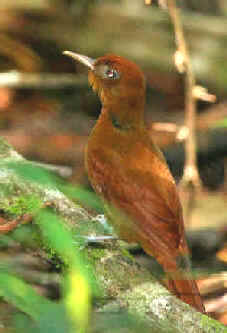
The Ruddy
Woodcreeper was one of over 300 species of birds
during our FONT Guatemala tour in Dec '08/Jan '09.
Photos of some others seen during the tour follow.
(above photo by
Marie Gardner)
Links:
Lists of Birds & Other Wildlife during our Guatemala Tour in December 2008 / January 2009
Cumulative List of Birds during FONT tours in Guatemala
Upcoming FONT Birding & Nature Tours in Central America
The following set of photos are just a few of the 317 species of birds that were
found during the FONT Holiday tour in Guatemala in Dec/Jan 2008-09. (These
photos by Dick Tipton.)
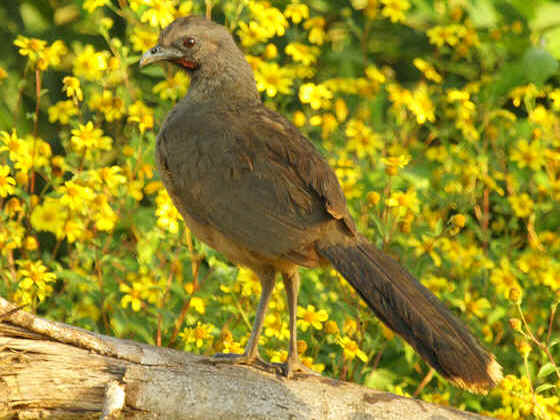
Plain Chachalaca
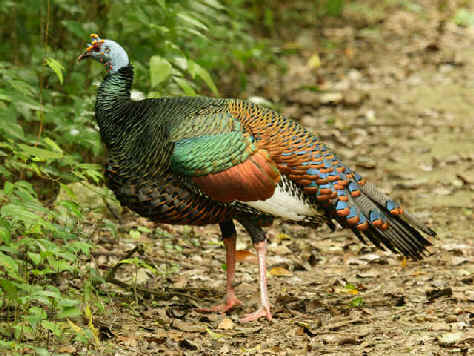
Ocellated Turkey
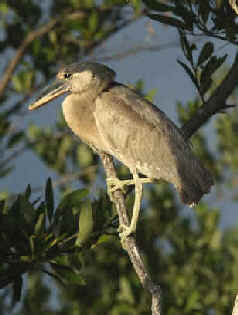
Boat-billed Heron
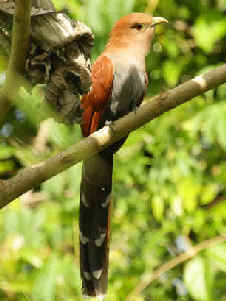
Squirrel Cuckoo
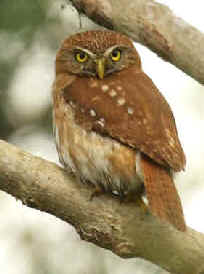
Ferruginous Pygmy-Owl
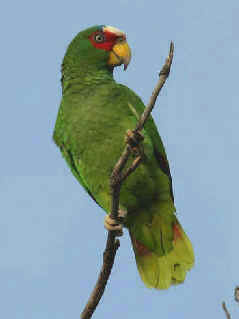
White-fronted Amazon
![]()
Mexico (in mostly the Yucatan) - November 2008
This was a tour in Mexico
with two "J"s - and with both of them during the same day: a Jabiru & a
Jaguar.
That morning, we saw closely a single Jabiru (it's a rare bird in Mexico).
Later
that day, at dusk, we saw a Jaguar. It too was close, during our 5
minutes of observing it ahead of us on the road in the forest, becoming even
more so, as the big cat walked, with its steady pace, to be immediately in front
of our vehicle. There it was seen at every angle as it turned to cross the road, and
then walked away a short bit before disappearing into the trees.
Another highlight of the tour was a beautiful Rufescent (or Thicket)
Tinamou that
walked, with its determined pace, right by us, as we were on the lower steps of
a Mayan temple.
And yet another highlight was by yet another remote Mayan temple in the forest -
an Orange-breasted Falcon.
At the opposite (or northern) end of the Yucatan
Peninsula, during one day we
saw thousands of birds. Over 20,000 of them were American
Flamingos.
Others, in the multitude that day included thousands more of other kinds, with
the assortment consisting of waterbirds, shorebirds, and some landbirds too.
Notable among the last of these groups was a single hummingbird, known as the
Mexican Sheartail - a rare bird with a very restricted range that's actually only about a
kilometer wide.
Among the waterbirds, there were hundreds of American White Pelicans, with many
feeding in unison on the water of the bay. The number of shorebirds were more
than imaginable. In swarms, all around us, most were Lesser Yellowlegs, Least
Sandpipers, other peeps, and Sanderlings. But there were others too, including a
variety of Plovers: Snowy, Piping, Wilson's, Semipalmated, and Black-bellied.
In the central Yucatan, a fascinating experience for us was in the "other
nature" category. Underground, in a pool of clear water in a cave, we saw, with our
flashlights, some Yucatanian endemic creatures that could never see us. In that
dark world, there were all-white: a fish, an eel, and a shrimp, that do not have
eyes!
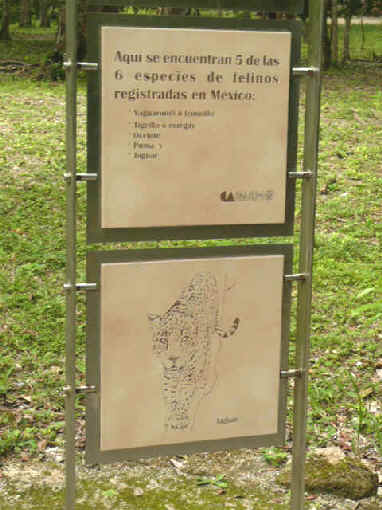
On this sign
at the Calakmul ruins in southern Mexico,
5 of the 6 species of wild cats that occur in Mexico are noted.
We saw the largest of these, the Jaguar,
along the road as we were going to the ruins.
(Photo by Peter Mooney during the FONT Nov 2008 Yucatan, Mexico tour)
Links:
List of Birds & Other Wildlife during our Mexico Tour - November 2008
List of Birds of the Yucatan Region of Mexico (with photos)
Upcoming FONT Birding & Nature Tours in Mexico & Central America
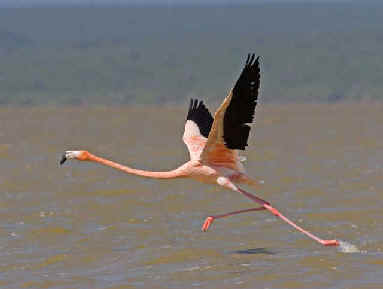
American Flamingo
During our November 2008 Mexico Tour in the Yucatan,
we saw thousands of these beautiful creatures.
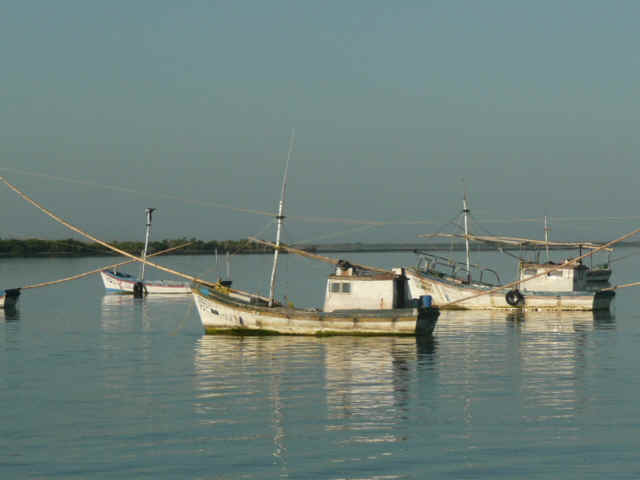
A fine scene along the
northern coast of the Yucatan Peninsula.
But the odd thing is that when we were there
we were seeing birds all the time,
and in this photo somehow there are none!
(Photo by Peter Mooney during our Nov 2008 Yucatan, Mexico tour)
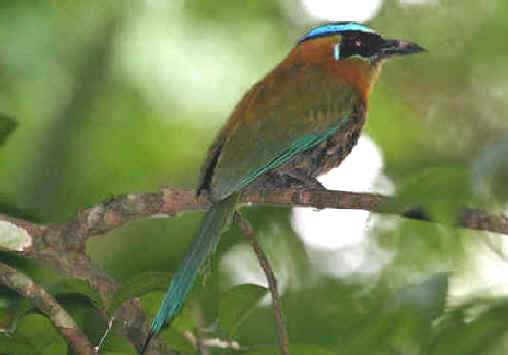
A Blue-crowned Motmot,
as seen by Mayan ruins during our November '08 Mexico Tour.
![]()
Iceland
- September/October 2008
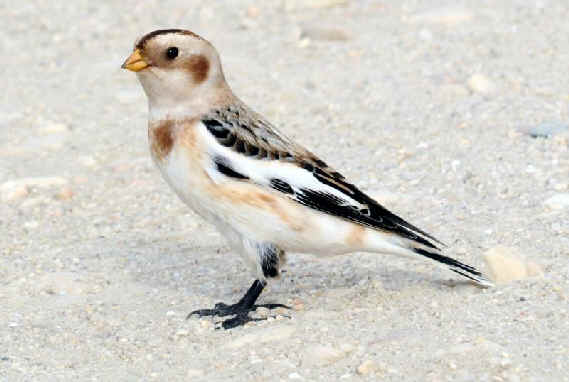
The Snow Bunting was one of the
landbirds
we saw in Iceland in the Fall of '08
During our week in Iceland, Sep 28 - Oct
6,
2008, there was so
much diversity in the nature that was around us.
Part of the country was still green,
with moss on volcanic rocks. There were rainbows and waterfalls.
And geysers and glaciers.
In the north, there was an early
snowfall. Above snow on the slopes of the hills, after dark, there were
beautiful displays in the sky of Aurora Borealis, or the Northern
Lights.
As white as the snow, was an Arctic Fox, close to us. Its nose and the
tips of its ears were black.
We saw at least 3 adult Gyrfalcons. One flew completely around us as we
were in our vehicle. A couple minutes later, it was chasing another Gyrfalcon.
The Ptarmigans that we saw were turning white.
Among other birds that were highlights were flocks of Barnacle Geese,
Harlequin Ducks, and Barrow's Goldeneyes.
This birding & nature tour was the 15th for FONT in Iceland.
During it, 5
new species of birds were added our cumulative list during tours in that country
(bringing it up to 101 species):
Buff-bellied (or American) Pipit (an
Icelandic rarity), American Black Duck, American Wigeon, Common Blackbird
(not at all common in Iceland), and Red Crossbill.
One morning, we
had an enjoyable time watching about 20 of the last of these, the crossbills,
along with about a dozen Eurasian Siskins, and many Redpolls.
There was a good crop of cones in the spruce trees. And, now, with more such
trees in Iceland, there are more birds there such as the crossbills and siskins.
Continue reading, if you would, about more of what we saw and experienced in Iceland during our 2008 fall
tour in that wonderful country for nature.
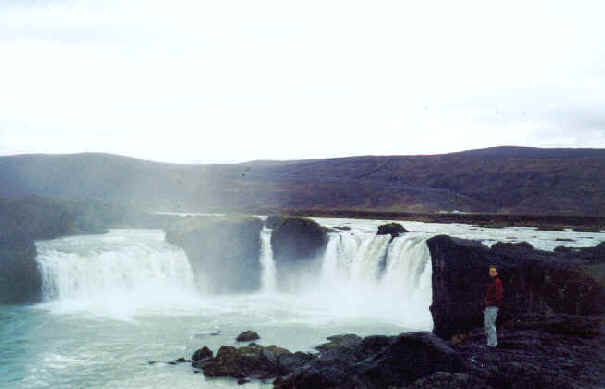
The waterfall known as "Godafoss",
one of a number that we saw in Iceland
during our Sep/Oct 2008 tour.
Links:
More about the FONT Iceland Tour in Sep/Oct 2008
Birds during previous FONT Iceland Tours (with photos)
Complete
Iceland Bird-List
(over
350 species, including vagrants from mainland Europe, Asia, & North America)
Birds during previous FONT tours in Europe (with photos)
Upcoming FONT Birding & Nature Tours in Iceland
![]()
New
Jersey, USA (mostly at
Cape May) - September
2008
During late September, when we were
there, Sep 26 & 27, Cape
May, New Jersey is one of the best places in eastern North America to
be to see birds.
Cape May is located at the southern tip of
New Jersey, on the north side of where the wide Delaware Bay meets the Atlantic
Ocean. And, so, with a good mix of habitats, a variety of birds can be seen
funneling through during their southbound migration, sometimes in large numbers.
That variety includes: raptors, waterbirds of various kinds, landbirds
of
numerous kinds, shorebirds, and even, when conditions are right, seabirds.
The most common of the raptors during our stay was the Osprey. We
saw many. Actually, nearly all of the birds of the various sorts, that were seen
during our time in far-southern New Jersey, were common, except for one - a Northern
Wheatear, that was seen quickly in the open on the ground, and then flew
away over bushes, not to be seen again.
When we continued after New Jersey, however, to our week-long tour in Iceland,
we did see Northern Wheatears again - but only during the first 3 days
there. In Iceland, they were by the coast, ready to migrate southeast, mostly to
Spain. A few Wheatears were found there, at one time, by a rock jetty,
where they were feeding on a swarm of small flying insects. In Iceland, as in
Cape May, the Wheatears would quickly fly away from us - but over rocks,
instead of over bushes.
In addition to Northern Wheatear, we found just a few other birds during
our time in both New Jersey & Iceland. Those, at both places, were: Mallard,
Merlin, Grey (or Black-bellied) Plover, Ruddy
Turnstone, Herring Gull, and Great Black-backed Gull, in addition to Common
Starling and Feral Pigeon.
Even though many birds do "funnel through" Cape May on their
southbound migration, chances are about nil that any of those just mentioned, as
seen in Iceland, would. From Iceland, most birds that migrate, go to mainland
Europe.
Almost as unlikely, it might well be said, were our chances of finding a
European birder in Iceland who had just been experiencing the bird migration in
Cape May when we were, but we did!
Having said that, both birds & birders do get
around!
![]()
Southern
Arizona, USA & Northern Mexico (in
Sonora) -
August/September 2008
During the first
part of this tour, in ARIZONA, a bird, normally of Mexico, was seen and heard.
That bird, a first for the United States, was the Sinaloa Wren (formerly
known as the Bar-vented Wren). Its new name is that of a
Mexican state, located south of the more-northerly Mexican state of Sonora,
which borders on Arizona.
During the second part of this tour, we were, during 3 days, in SONORA,
MEXICO,
where, at a remote ranch, we birded and explored in some of the most pristine
countryside imaginable. Among our "Mexican" bird species there, in
addition to another Sinaloa Wren, there was, in the riparian plants at the
base of a magnificent canyon, the Rufous-capped Warbler.
During the ARIZONA portion of the tour, as usual as during our previous tours,
we enjoyed a wonderful assortment of Hummingbirds, including a couple
species that are more common in Mexico, the White-eared, the
Violet-crowned, and the
Lucifer.
In addition to birds, during this tour, there was a fine assortment of butterflies,
mammals, and reptiles.
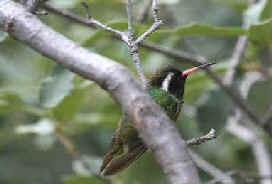
White-eared Hummingbird
Links:
More about the FONT Southern Arizona & Northern Mexico Tour in Aug/Sep 2008
Birds
& Other Wildlife during our southern Arizona & northern Mexico Tour in
Aug/Sep 2008
Birds of Arizona,
Part 1: Quails to Becard (with some photos)
Birds of Arizona, Part 2: Flycatchers to Buntings (with some photos)
Birds of Mexico, Part 1: Tinamous to Shorebirds (with some photos)
Birds of Mexico, Part 2: Jaegers to Woodpeckers (with some photos)
Birds of Mexico, Part 3: Manakins to Buntings (with some photos)
Mammals of Arizona (with some photos)
Mammals of Mexico (with some photos)
Amphibians & Reptiles of Arizona (with some photos)
Amphibians & Reptiles of Mexico (with some photos)
Butterflies and Dragonflies & Damselflies of Arizona (with some photos)
Upcoming FONT Birding & Nature Tours in Arizona
Upcoming FONT Birding & Nature Tours in Mexico
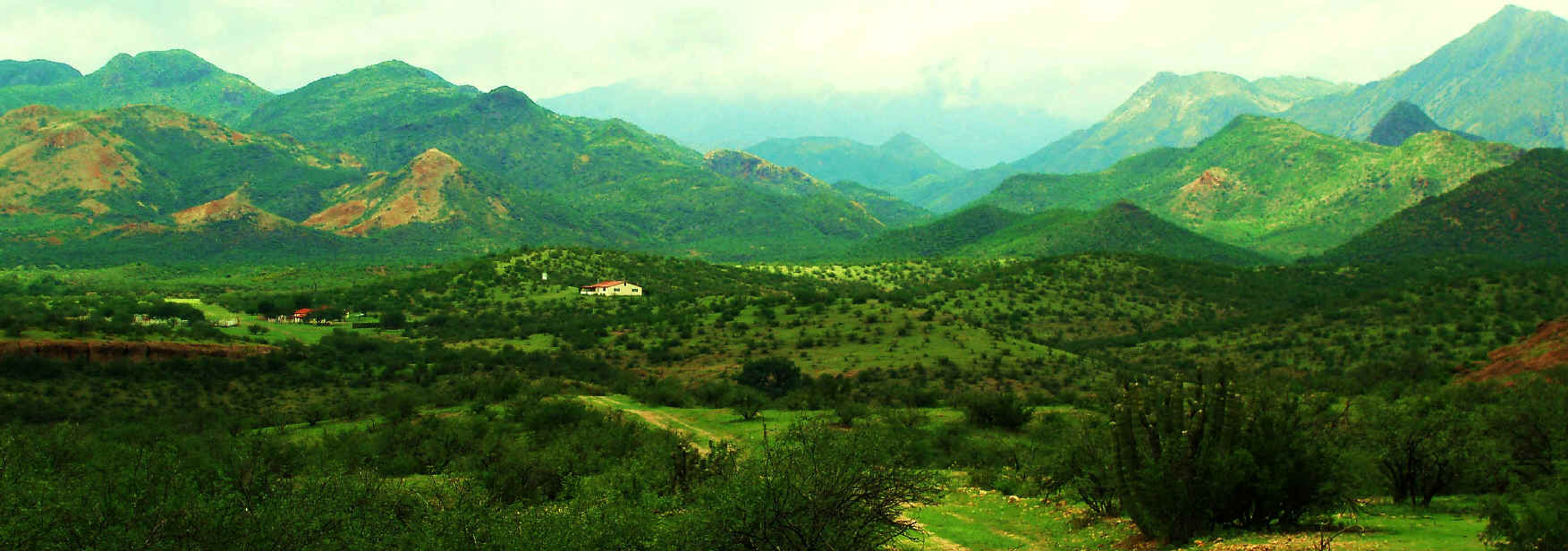
It was in the
building on the hill with the red roof
where we stayed during our days & nights
in remote eastern Sonora in northern Mexico
during our tour in September 2008.
Birds in the area included: Montezuma and
Elegant Quails,
Zone-tailed Hawk, Rose-throated Becard,
Sinaloa Wren, Rufous-capped Warbler,
Mexican Yellow Grosbeak, Five-striped Sparrow,
and both Rufous-winged &
Rufous-crowned Sparrows.
Pumas
are said to be common in the area as are
White-nosed Coatis &
Collared Peccaries.
We saw a number of Coue's White-tailed Deer,
Antelope Jackrabbits,
and various bats.
Early in the mornings, Coyotes
howled close to where we stayed,
actually just outside our windows.
At dusk, Common Poorwills
called, even though it was early September.
After dark, in the completely-clear sky, there was a superb show
of stars & planets,
with a brilliant Milky Way
that stretched from nearly horizon to horizon.
A couple very bright "falling
stars" were also in the
cast of celestial characters.
This was as some Elf Owls
called, even though, again,
it was September.
Below is another view from elsewhere on the property
where we stayed in Sonora, Mexico in September '08.
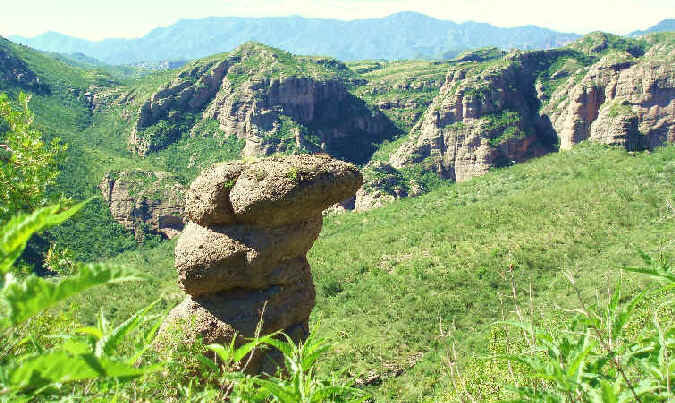
![]()
Brazil
(Southeast
& Mato Grosso do Sul) &
adjacent Argentina & Paraguay - July/August 2008
Again, during this
FONT tour in Brazil, our 43rd, a nice assortment of birds & animals
were seen. Also, particularly in the area of Iguazu Falls, there was a
tremendous variety of butterflies.
Among the mammals during the tour, highlights included: a wonderful look
at a Brazilian Tapir, as many as 7 Giant Anteaters in one day (including
a mother with a young animal on its back), a fine look at an Ocelot,
and two Giant Otters seen very well.
Nearly 300 species of birds were found.
Among the last of them, on August 18th, on the grass at
the airport in Campo Grande, there was, in addition to Red-winged Tinamous,
an Upland Sandpiper, having just flown in from North America.
On a nearby
wire, that day, there were 3 Purple Martins, also having just come from North
America.
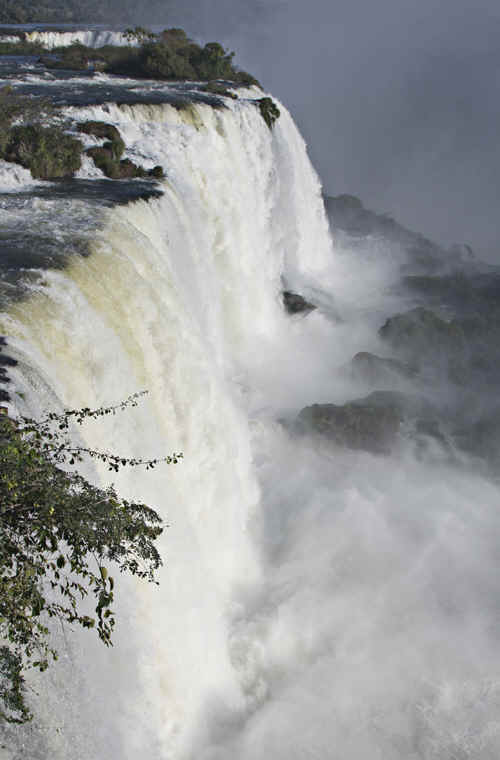
Iguacu Falls
(photo by Trevor
Sims,
during the FONT Tour in Brazil in August 2008)
Links:
List of Birds & Other Wildlife during our Brazil Tour - July/August '08
Cumulative
List of Birds during FONT Brazil Tours:
Part
1: Tinamous to Flycatchers
Part 2: Antshrikes to Grosbeaks
Birds in Mato Grosso do Sul (with photos)
Birds in Southeast Brazil (with photos)
Rare Birds during FONT Tours in Brazil (with photos)
Mammals & Other Wildlife during FONT Brazil Tours (with photos)
Butterflies of Brazil & Argentina, including those at Iguazu Falls (with photos)
Upcoming FONT Birding & Nature Tours in Brazil
![]()
Mexico
(mostly the
Yucatan: also Cozumel Island)
- June 2008
This tour, as
noted, was mostly on the Yucatan Peninsula, and also on
Cozumel Island, 12 miles
offshore. We say "mostly on the Yucatan Peninsula" as we also went
further south, into remote areas, quite wild, close to the Mexican borders with
Guatemala and Belize. Most notable of those areas was Calakmul. Not only a
remote, not often visited, site of Mayan ruins, comparable to Tikal in
Guatemala, Calakmul is vast reserve known as a biosphere. Standing atop the
highest temple there one sees as far as the horizon in all directions only a sea
of green foliage of forest. Calakmul was one of 4 biospheres that we visited
during our tour, during which we found over 200 species of birds.
And there could have been more as the Yucatan is a bird-rich area. Not only is
it with many different birds (about 540 species cumulatively recorded in 75
families - that's about half of the 100 or species that occur in Mexico), but
the Yucatan has a number of interesting species and subspecies as the isolated
region has evolved, due to a number of factors, to have its own distinctive
flora and fauna. Thus, it has 14 endemic species of birds, and almost 100
endemic subspecies.
And the bird-life on Cozumel Island is interesting too, as it has
3 endemic
species and about 15 endemic subspecies.
To read about these interesting birds of the Yucatan and
Cozumel, click the link
above.
Among our favorite birds of this tour were the endemic Yucatan Wren (the last of
the Yucatan species to be described, in 1934), and the nearly-endemic Mexican
Sheartail. That hummingbird has a very interesting range. Like the Yucatan, or
Black-throated, Bobwhite, it is restricted to the Yucatan all but for a small
isolated population elsewhere. But on the Yucatan, it only occurs in the north,
near the coast, where its range has only the width of just over a
kilometer!
All of the endemics & those nearly-endemics notwithstanding, the bird that
we liked the most during our tour was one with an extensive range in Central
& South America. But we saw it so well! And it stayed - just a few feet from
us. It was the little and brightly-colored American Pygmy Kingfisher, by a small
marsh in the forest in that wild area of Calakmul.
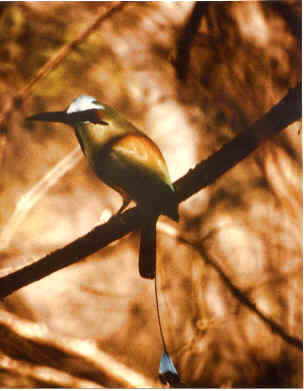
The Mayans called it "TOH".
We know it as the
TURQUOISE-BROWED MOTMOT.
We saw many during our June '08 Mexico Tour.
Links:
More
about the FONT Mexico Tour in June 2008
List of Birds & Other Wildlife during our Mexico Tour - June 2008
List of Birds of the Yucatan Region of Mexico (with photos)
Upcoming FONT Birding & Nature Tours in Mexico & Central America
![]()
Dominican Republic - March/April 2008
During this, the 17th FONT birding & nature tour on the Caribbean island of Hispaniola, we had the best look we've ever had of the Western Chat-Tanager - a wonderful look of a bird that's normally a skulker, very hard to see. Another nice sight for us a line of about a dozen Hispaniolan Crossbills, drinking at the edge of a pool of water in a pine forest. These 2 rare species were among about 120 different birds that we saw during our tour. Many of them were interesting in not only being rarities, but also as either endemic species or subspecies found nowhere else in the world other than on that single Caribbean island. Our travel, and our quest for birds, on the island took us from the sea coast, and a desert even below sea level, to an elevation as high as 7,000 feet up in the mountains, including the area in the pines where we watched the crossbills.
The "Top Birds" of our March/April 2008 Dominican Republic Tour, as voted for by
the participants after the tour, were:
1 - Western Chat-Tanager
2 - Broad-billed Tody
3 - White-tailed Tropicbird
4 - Hispaniolan Trogon
5 - Golden Swallow
6 - Hispaniolan Crossbill
7 - American Flamingo
8 - Northern Potoo
9 - Antillean Piculet
10 - Least Poorwill
11 - Hispaniolan Lizard Cuckoo
Links:
List of Birds during our Dominican Republic Tour - March/April 2008
Cumulative List of Birds during our Dominican Republic Tours
Birds during previous FONT Tours in the Caribbean (with photos)
Rare
Birds of the Caribbean
Upcoming FONT Birding & Nature Tours in the Caribbean
![]()
Brazil
(Southeast,
Minas Gerais, & Mato Grosso do Sul)
- March 2008
During this, the
42nd FONT birding & nature tour in Brazil,
again, as during our tours there in the past, wonderful birds and animals were
seen.
Such tours in Brazil usually bring to mind notable birds as the Hyacinth
Macaw and the Jabiru. These we saw, but also there were so many other
birds, and among them highlights including the very rare Brazilian Merganser,
a pair of Crowned Solitary Eagles, the Cock-tailed Tyrant, and the
tiny & very localized Buff-throated Purpletuft.
This was the 6th FONT
tour with the Brazilian Merganser, one of the rarest birds in the world.
(That's 6 times out of 7 tries for that bird.)
Among the mammals during the tour, an Ocelot was seen so nicely as
it walked backed & forth on a dirt road ahead of us, and a Maned
Three-toed Sloth was seen, in an area where not expected - in
lowland Atlantic Forest near the Brazilian Seacoast. But see it we did, and so very
well, as it so very slowly, made its way down a tree in front of
us.
Other animals that we saw included: Six-banded Armadillo, Tapiti (or
Forest Rabbit), Paca, Capybara, the cat known as the Jaguarundi,
Crab-eating and Hoary Foxes, Crab-eating Raccoon, Neotropical River
Otter, and 3 species of deer.
Back again to the Maned Three-toed
Sloth, it's a rare and endangered mammal, and was a "new one" for FONT in Brazil, being the 69th
species of mammal for us in that country (excluding bats - and we saw
a few of them too).
Also during our March '08 Brazil tour, a nice assortment of butterflies was seen.
Links:
More about the FONT Brazil Tour in March 2008
List of Birds during our Brazil Tour - March 2008
A Photographic Sampling of Nature & Scenery from the FONT March 2008 Brazil Tour
Cumulative
List of Birds during FONT Tours in Brazil:
Part
1: Tinamous to Flycatchers
Part 2: Antshrikes to Grosbeaks
Birds in Minas Gerais (with photos)
Birds in Mato Grosso do Sul (with photos)
Birds in Southeast Brazil (with photos)
Rare Birds during FONT Tours in Brazil (with photos)
Mammals & Other Wildlife during FONT Brazil Tours (with photos)
Upcoming FONT Birding & Nature Tours in Brazil
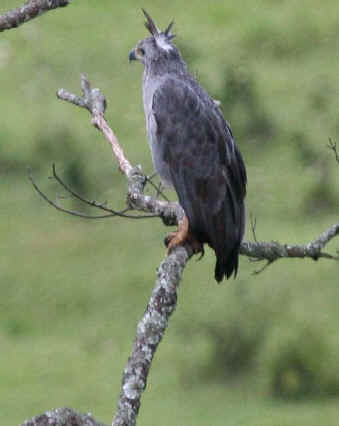
The Crowned Solitary
Eagle,
seen during our March 2008 Brazil Tour,
that was voted the "top bird" of the tour.
This is one of the pair of eagles we saw together.
(photo by Marie Gardner)
![]()
This was the 30th
FONT birding & nature tour in Japan. Highlights, as
usual, during our tours there in the winter, included: cranes and eagles
and the Blakiston's Fish-Owl.
We saw both Steller's Sea Eagles and White-tailed
Eagles on the northern Japanese island of Hokkaido.
There were good numbers of each, and we saw both species well. We also saw a
third species of eagle during the tour, a single Greater Spotted Eagle on
the southern Japanese island of Kyushu.
5 of the 15 species of the world's cranes were seen during the tour. The
Red-crowned, or Japanese, Cranes were seen in Hokkaido, while
numerous Hooded and White-naped Cranes were seen in Kyushu, along
with two stragglers there, the Common and the Sandhill Cranes.
We had the very good good
fortune, to see, one evening, two large and rare Blakiston's
Fish-Owls, a pair that we watched close to us, and that we heard calling in
duet! With this tour, we've now seen that special bird during ALL of our 19 late-fall or winter birding
tours in Japan.
On Kyushu, in addition to thousands of cranes, we saw hundreds of
Mandarin Ducks along one particular river. Where that river meets the sea, on a
mudbar, we were treated to Spoonbills - both the rare Black-faced, and the Eurasian.
Nearby, we encountered a rarity for Japan, a Pied Avocet. With it was a
similar bird, also unusual for Kyushu, a Black-winged Stilt.
The Mandarin Ducks were not the only attractive waterfowl during the tour. We
also enjoyed, on Hokkaido, the equally attractive Smews and Harlequin
Ducks.
Birds mentioned here were just some of those that we enjoyed during this,
another fine Japanese tour.
Links:
More about the FONT Japan Tour in January 2008
List of Birds during our Japan Tour - January '08
Cumulative List of Birds during our Japan Tours (with photos)
Rare Birds during FONT Tours in Japan
Upcoming FONT Japan Birding & Nature Tours
![]()
Lesser Antilles (Dominica) - January 2008
During this tour,
where the year for FONT began, there were both "Parrots & Pirates of the Caribbean".
On the lush, green Caribbean island
of Dominica, we saw endemic, rare Amazon parrots (2 species)
as well as the filming locations of the 2nd & 3rd "Pirates of the
Caribbean" movies.
In all, during this, our annual "holiday tour", which also included St.
Lucia & St. Vincent in December '07, we saw 80 species of
birds, most of which were Caribbean specialties, and many them were
island-endemics, rarities, or birds that were just-plain nice to
see.
Links:
More
about the FONT Lesser Antilles Tour in Dec '07/Jan '08
List of Birds during our Lesser Antilles Tour - Dec '07 / Jan '08
Cumulative List of Birds during FONT Lesser Antilles Tours
Cumulative List of Birds during FONT Caribbean Tours (with photos)
Upcoming
FONT Caribbean Birding & Nature Tours
![]()
![]()